Unlocking Ideas: 100+ Prompts Tailored for the 7th-Grade Mind
By: Author Valerie Forgeard
Posted on August 17, 2023
Categories Writing
You’re about to dive into the world of writing prompts for 7th graders. You’ll discover their importance, explore various types, and learn how to choose the right one. This article aims to help you encourage creativity and boost critical thinking skills in your classroom or at home.

Key Takeaways
- Writing prompts ignite creativity and improve writing skills.
- Prompt categorization helps identify strengths and weaknesses.
- Challenging prompts can be rewarding.
- Understanding student interests is crucial for engaging 7th graders.
100 Writing Prompts for 7th Graders
Personal writing is like opening a window into your soul, allowing fresh insights to pour in and old doubts to flutter out. Every prompt is an invitation, a beckoning to delve deeper into your own psyche, experiences, and aspirations.
From your bravest moments to your most profound failures, these questions aim to guide you through a labyrinth of emotions, dreams, and memories.
Whether you’re a seasoned journal enthusiast or someone looking to start, this collection ensures that every day becomes an opportunity for introspection. Embrace the quest of understanding oneself, and let these prompts light your path.
- Write about a time you ventured out of your comfort zone.
- Reflect on your proudest achievement to date.
- If you could switch lives with someone, who would it be?
- Describe your ultimate leisure activity in detail.
- Recall a time fear gripped you.
- Sketch out your dream holiday scenario.
- Share a pivotal life lesson and its source.
- Narrate a day from your pet’s perspective.
- Envision an invention to better our world.
- List traits of a true friend.
- Reflect on a moment you swelled with pride.
- If you could reside anywhere, where would that be?
- Set a goal for this academic year.
- Talk about a moment of sheer disappointment.
- Dream up your superhero persona.
- Which possession holds great sentimental value?
- Plan your ideal weekend.
- Remember an instance when inspiration struck.
- Jot down things that tickle your funny bone.
- Offer a piece of advice for newcomers to your school.
- Paint a picture of your serene natural spot.
- Revisit a moment of profound gratitude.
- Describe your envisioned career path.
- Reflect on a holiday that warms your heart.
- Recall an experience with a hard-hitting lesson.
- Compliment yourself on a unique quality.
- Describe an unforgettable gesture of kindness towards you.
- Share feelings from a lonesome period.
- Define the markers of a commendable teacher.
- Take a trip down a cherished childhood memory lane.
- Introduce yourself to your role model.
- If you had a global platform for a day, what’s your message?
- Confront your greatest phobia.
- Chronicle a burst of creativity.
- Savor the memory of your most delectable meal.
- Celebrate what sets you apart from the crowd.
- Open up about facing and overcoming adversity.
- Rekindle one of life’s joyful milestones.
- If time travel were possible, where and when would you go?
- Describe your birthday bash of dreams.
- Recommend an unforgettable book.
- Unravel feelings from an anxious episode.
- Choose your dinner companion from any point in history.
- Revel in your favorite season’s charms.
- Salute your bravest act.
- Share three happiness sources.
- Reflect on a treasured family custom.
- If the zoo gates opened, which animal becomes your pet?
- Define the essence of friendship.
- If there’s one item in infinite supply, what’s your pick?
- Describe your ultimate weekend blueprint.
- Embark on your most thrilling adventure again.
- Spell out your most anticipated month.
- Recall a moment that tested your mettle.
- Who would attend your ideal birthday celebration?
- What qualities form a steadfast friend?
- Introduce your safe haven or retreat.
- If you were to compete in the Olympics, your sport is?
- Ponder upon a transformative experience.
- Which tune resonates with your soul?
- If any subject was available, what’s your elective?
- Share your strategy against looming fears.
- Detail your fantasy expedition.
- Reiterate a life-changing piece of advice.
- Unearth memories of a creative spree.
- Spotlight a goal for the upcoming year.
- Who stands as the beacon of heroism in your life?
- Set three targets for your current educational phase.
- Envision an unrestricted course for the next term.
- What activity makes weekends special for you?
- Recall a testing moment and its aftermath.
- Who’s the beacon of heroism in your world?
- Draft an action plan for an imminent objective.
- Explore an instance when motivation fueled you.
- If you could decode any subject next term, what would it be?
- Revisit an encounter that changed your perspective.
- If you could amplify a single trait, which would it be?
- What does an average day in your life look like?
- Share a moment when you stood up for something.
- Pen down your thoughts about personal growth.
- Recall an incident that evoked strong emotions.
- Describe a challenge and its valuable lessons.
- List hobbies that relax and rejuvenate you.
- Reflect on a time you surpassed your own expectations.
- Describe an act that left a lasting impact on you.
- Which creature comforts bring you the most joy?
- Share insights from an eye-opening book.
- Describe a random act of kindness you’ve recently witnessed.
- Chronicle a moment of sheer determination.
- If you were a novel character, who would you be?
- Reflect on an experience with a profound impact.
- Which fantasy realm would you reside in?
- Recall a time when a movie deeply moved you.
- If you authored a book, what’s its core message?
- Share your feelings on an unresolved personal challenge.
- Remember a moment that tested your patience.
- Explore feelings from a challenging transitional phase.
- Share an unexpected source of inspiration.
- Describe a ritual that centers and grounds you.
- Reflect on a time you stepped up as a leader.
Understanding the Importance of Writing Prompts

It’s vital for 7th graders to understand that writing prompts aren’t just school tasks, they’re tools to ignite their creativity and improve their writing skills. Prompt categorization helps you identify your strengths and weaknesses in different areas of writing. For instance, are you better at descriptive or narrative pieces? Use these prompts as a pathway to discover your unique voice.
Prompt diversity is also crucial. By responding to various types of prompts – from persuasive essays about current events to creative stories about imaginary worlds – you’ll become a more versatile writer. Don’t shy away from challenging ones; they can sometimes be the most rewarding!
Exploring Different Types of Writing Prompts

Let’s delve into the various kinds of assignments they’ll encounter. The key to prompt variety is understanding its role in student engagement.
You see, diverse prompts can cater to different learning styles and interests, making writing tasks more appealing.
Consider narrative prompts that encourage students to fabricate a story or share personal experiences. These stimulate creativity and self-expression.
Descriptive prompts, on the other hand, refine sensory observation skills as students paint vivid images with words.
Compare-contrast prompts foster critical thinking by analyzing similarities and differences between subjects.
Lastly, persuasive prompts develop argumentation skills as students defend their standpoints.
Tips to Choose the Right Writing Prompt

You’re about to dive into the art of choosing the right writing prompt, and it’s crucial you understand three key factors: student interests, difficulty level, and learning outcome.
It’s not enough to pick a prompt at random; you’ve got to hone in on what your students are passionate about to truly engage them.
Balancing their interests with an appropriate challenge and clear learning goals will make all the difference in their educational journey.
Understanding Student Interests
Understanding your students’ interests can significantly enhance your ability to create engaging writing prompts. It’s essential to consider student hobbies and extracurricular activities while crafting these prompts. This step not only fosters a connection between you and your pupils, but it also makes the learning process more enjoyable for them.
Here are some ways to explore their interests:
- Conduct surveys or questionnaires
- Keep an eye out for what they get excited about in class
- Engage with parents or caregivers about student hobbies outside school
- Observe their participation in extracurricular activities
Difficulty Level Consideration
It’s equally important to take into account the difficulty level of the tasks you’re assigning. You must strike a balance with prompt complexity to encourage student adaptability, not frustration. Too simple, and they’re bored; too hard, and they may give up.
Consider their academic abilities: Are they struggling or excelling? This requires adjusting your expectations and prompts accordingly. Engage them with challenges that stretch their capabilities but remain within reach.
Also, diversify task types — mix easier tasks with complex ones. This approach fosters resilience as students navigate different levels of challenge while boosting their confidence when they complete trickier assignments successfully.
Prompt’s Learning Outcome
Right on the heels of considering the difficulty level, you’re now ready to tackle ‘Prompt’s Learning Outcome.’
Understanding the outcome is paramount in prompt evaluation and curriculum integration. So, how can you ensure that your writing prompts are pedagogically effective?
- Start by aligning them with specific learning objectives.
- Next, consider how they fit into wider units or themes in your curriculum.
- Evaluate whether they encourage critical thinking and creativity.
- Lastly, think about their potential for engaging students and sparking interest.
Encouraging Creativity in 7th Graders

You’re about to explore three essential elements that can ignite the spark of creativity in your 7th graders: boosting creative thinking, innovative writing exercises, and nurturing artistic expression.
Each component is designed not only to enhance their academic skills but also to unleash their imaginative power.
Boosting Creative Thinking
Boosting creative thinking is often achieved through engaging in various forms of art, such as painting and music. But let’s not forget about writing too! You can overcome creativity barriers by using unconventional prompts.
Here are a few tips to help you:
- Break the norm: Use prompts that challenge traditional thinking. This could be an unusual scenario or a different perspective.
- Embrace randomness: Let unpredictability fuel your imagination. A random word or image can spark unique ideas.
- Think visually: Drawings or photos can serve as great prompts too, stimulating your visual intelligence.
- Be open to failures: Don’t fear making mistakes; they’re part of the creative process.
Innovative Writing Exercises
Let’s dive into some innovative exercises that’ll surely ignite your creative writing skills. Experiment with prompt variations and storytelling techniques to stretch your imagination.
For instance, try altering a well-known fairy tale by changing its setting or ending. This engages your creativity and helps you explore different narrative possibilities.
Another exercise is to use an object in your room as the central element of a story. Describe it vividly, give it a backstory, make it the hero or villain – there’re no limits!
Also consider retelling an event from multiple perspectives. It can be any historical event or even something mundane like making breakfast.
These exercises aren’t just fun but also great training in perspective-switching, character development, and plot creation. Give it a shot!
Nurturing Artistic Expression
Nurturing artistic expression isn’t only about mastering technical skills. It’s also about exploring one’s emotions and experiences in a creative way. As you facilitate your 7th grader’s artistic development, consider employing different expression techniques that will help them convey their thoughts and feelings effectively.
Here are some strategies to guide you:
- Encourage open-ended creativity: Don’t limit them to traditional forms of art.
- Provide an environment that fosters imagination: Surround them with inspiring materials and resources.
- Teach them how to use various tools: Brushes, pens, clay – the choices are endless.
- Promote emotional intelligence: Help them understand their feelings and translate those into art.
Writing Prompts to Boost Critical Thinking Skills

Encouraging critical thinking skills in 7th graders can be achieved through well-crafted writing prompts. Promoting empathy and digital literacy is a great way to do this.
Begin by presenting situations that require students to step into someone else’s shoes. Ask them how they’d feel, react, or handle those circumstances. This will not only stimulate their imagination but also foster understanding and compassion.
Incorporating digital literacy is equally important. You can assign tasks where they’ll need to evaluate the credibility of online sources or identify fake news. As they navigate these challenges, they’re honing their ability to discern truth from falsehood—an essential skill for the 21st century.
Narrative Writing Prompts for 7th Graders

You’re about to embark on a journey through narrative writing prompts specifically designed for 7th graders.
We’ll delve into the exploration of personal experiences, create imaginative scenarios, and reflect deeply through journal entries.
Get ready, as this adventure will not only hone your writing skills but also give you a chance to introspect and voice your thoughts in an engaging way.
Exploring Personal Experiences
Think about a time when you’ve faced a tough decision and what you learned from that experience. Exploring personal experiences can be an insightful journey into your own personal growth documentation, often revealing unseen perspectives.
When writing about personal experiences, consider these elements:
- Describe the situation in detail
- Identify the choices you had available
- Explain why it was a challenging choice
- Share what you learned from this experience
Writing about your own life isn’t just engaging for others to read, it’s also enlightening for yourself. It allows exploration of unseen perspectives and provides invaluable documentation of your personal growth.
Imaginative Scenario Prompts
Let’s dive into imaginative scenario prompts. They’re a fantastic way to spark creativity and broaden your horizons.
Picture this: you’re exploring alien encounters on a distant planet. How do you communicate? What does their society look like? These prompts push you to think outside the box and concoct wildly inventive narratives.
Now, let’s take a deep breath and plunge into underwater adventures. You’re swimming among vibrant coral reefs, encountering mysterious sea creatures. How do you navigate this new environment? What undiscovered species might lurk in the depths?
These scenarios aren’t just fun; they enhance critical thinking and writing skills. So next time you need inspiration, remember these unique scenarios. They’ll certainly stretch your imagination!
Reflective Journal Entries
Reflective journal entries can be quite enlightening. They’re an excellent tool for processing your thoughts and emotions. As a 7th grader, these can help you understand your emotional intelligence and navigate peer interactions better.
Consider the following prompts for your reflective journal entries:
- Reflect on a recent situation where you effectively managed your emotions.
- Narrate an incident involving a peer interaction that led to personal growth.
- Discuss how understanding others’ emotions has improved your relationships.
- Ponder over the role of empathy in enhancing emotional intelligence.
Writing about these will not only refine your writing skills but also boost self-awareness. So, grab a pen and start exploring yourself through words! Remember, it’s not just about recording events but recognizing feelings too.
Persuasive Writing Prompts for 7th Graders

You’ll find these persuasive writing prompts for 7th graders engaging and challenging. They are specially designed to have cultural relevance, making them more relatable and interesting for your students. For instance, one prompt could be debating the significance of celebrating diverse cultures in schools.
Moreover, incorporating humor into these prompts can make the learning process more enjoyable. You can ask your students to write a persuasive essay on why their favorite comedian should be considered a national treasure. This task will surely spark their interest and creativity.
Using these tactics not only enhances their critical thinking but also improves their ability to communicate effectively with others. It’s an excellent way to prepare them for real-world situations while keeping things fun and engaging!
Expository Writing Prompts for 7th Graders

Switching gears, expository tasks encourage your 7th grade students to investigate an idea, evaluate evidence, and present a clear point of view on the subject. Here’s where prompt selection strategies come into play. Selecting the right expository writing prompts can trigger their imagination and analytical skills.
Expository writing benefits are plenty:
- It enhances critical thinking.
- Boosts research skills.
- Improves clarity in communication.
- Increases knowledge on various topics.
You’ll find that it’s not just about improving their writing but also enriching their understanding of the world around them. So don’t hesitate to challenge them with diverse topics from technology to social issues. Remember, the goal is to make learning enjoyable and engaging while fostering intellectual growth.
Dealing With Writer’s Block

When tackling writer’s block, it’s important that you don’t let it intimidate you; instead, view it as a challenge to overcome. Consider this block overcoming strategy: seek inspiration from different sources and ignite your creativity. Maybe read a book or watch a movie that excites you. Take a walk in nature or listen to some music. You’d be surprised how these little things can spark your creative ignition.
How to Use Writing Prompts Effectively

Utilizing thought-provoking questions effectively can significantly aid in overcoming writer’s block and reigniting your creativity. To make the most of writing prompts, consider prompt personalization. Tailor each prompt to resonate with your interests or experiences.
Here are some tips on how to use writing prompts effectively:
- Personalize the scenario: Change the characters or setting to something more relatable.
- Use it as a jumping-off point: Let the prompt inspire you, but don’t feel limited by it.
- Add a twist: Modify the prompt to add an unexpected element that sparks your creativity.
- Set a timer: This can increase your writing motivation by creating a sense of urgency.
The Role of Feedback in Writing

It’s critical to understand the role of feedback in the writing process, as it offers a fresh perspective and can help hone one’s skills. Peer evaluation plays a significant part here. It allows you to receive reactions from someone who is on an equal footing with you and understands your position.
Feedback interpretation is another crucial aspect. You shouldn’t take criticism personally, instead see it as an opportunity for growth. Understand that each piece of advice given is meant to improve your writing abilities.
Example Writing Prompts and Responses

You’re going to find examples of prompts and responses incredibly useful for understanding the concept better. When it comes to prompt selection, it’s crucial to choose ones that will spark student motivation and push their thinking boundaries. Remember, you want your students not only to write but also to enjoy the process.
Here are a few example prompts:
- Write about a time when you had to make a tough decision.
- Describe a place that makes you feel happy.
- Imagine what life would be like if we could live on another planet.
- Craft an argument for or against school uniforms.
The aim is not just completion, but engagement. So, always consider students’ interests and aspirations when selecting prompts. This approach ensures they stay motivated throughout their writing journey.
The Benefits of Regular Writing Practice

After exploring various writing prompts and seeing how they can be tackled, let’s now dive into the benefits of regular writing practice.
As a 7th grader, you’re likely encountering more complex language tasks. Regular writing doesn’t just improve your ability to craft engaging stories or persuasive arguments; it also contributes significantly to your language development and vocabulary enhancement.
By consistently practicing, you’ll naturally expand your vocabulary as you strive to express yourself accurately and eloquently. You’re not just jotting down words—you’re learning how they interact, how they convey nuanced meanings, and how best to use them in different contexts.
So keep sharpening that pen (or keyboard!). The benefits are manifold: better academic performance, improved communication skills, even enhanced critical thinking.
Embrace the journey!
So, you’re all set to boost your 7th grader’s writing skills. Remember, the perfect prompt can ignite their creativity and critical thinking. Use them effectively, give constructive feedback, and encourage regular practice.
Dive into this exciting world of words together and watch them grow as confident, articulate writers!
Have a language expert improve your writing
Run a free plagiarism check in 10 minutes, generate accurate citations for free.
- Knowledge Base
- How to write an expository essay
How to Write an Expository Essay | Structure, Tips & Examples
Published on July 14, 2020 by Jack Caulfield . Revised on July 23, 2023.
“Expository” means “intended to explain or describe something.” An expository essay provides a clear, focused explanation of a particular topic, process, or set of ideas. It doesn’t set out to prove a point, just to give a balanced view of its subject matter.
Expository essays are usually short assignments intended to test your composition skills or your understanding of a subject. They tend to involve less research and original arguments than argumentative essays .
Instantly correct all language mistakes in your text
Upload your document to correct all your mistakes in minutes

Table of contents
When should you write an expository essay, how to approach an expository essay, introducing your essay, writing the body paragraphs, concluding your essay, other interesting articles, frequently asked questions about expository essays.
In school and university, you might have to write expository essays as in-class exercises, exam questions, or coursework assignments.
Sometimes it won’t be directly stated that the assignment is an expository essay, but there are certain keywords that imply expository writing is required. Consider the prompts below.
The word “explain” here is the clue: An essay responding to this prompt should provide an explanation of this historical process—not necessarily an original argument about it.
Sometimes you’ll be asked to define a particular term or concept. This means more than just copying down the dictionary definition; you’ll be expected to explore different ideas surrounding the term, as this prompt emphasizes.
Receive feedback on language, structure, and formatting
Professional editors proofread and edit your paper by focusing on:
- Academic style
- Vague sentences
- Style consistency
See an example

An expository essay should take an objective approach: It isn’t about your personal opinions or experiences. Instead, your goal is to provide an informative and balanced explanation of your topic. Avoid using the first or second person (“I” or “you”).
The structure of your expository essay will vary according to the scope of your assignment and the demands of your topic. It’s worthwhile to plan out your structure before you start, using an essay outline .
A common structure for a short expository essay consists of five paragraphs: An introduction, three body paragraphs, and a conclusion.
Like all essays, an expository essay begins with an introduction . This serves to hook the reader’s interest, briefly introduce your topic, and provide a thesis statement summarizing what you’re going to say about it.
Hover over different parts of the example below to see how a typical introduction works.
In many ways, the invention of the printing press marked the end of the Middle Ages. The medieval period in Europe is often remembered as a time of intellectual and political stagnation. Prior to the Renaissance, the average person had very limited access to books and was unlikely to be literate. The invention of the printing press in the 15th century allowed for much less restricted circulation of information in Europe, paving the way for the Reformation.
The body of your essay is where you cover your topic in depth. It often consists of three paragraphs, but may be more for a longer essay. This is where you present the details of the process, idea or topic you’re explaining.
It’s important to make sure each paragraph covers its own clearly defined topic, introduced with a topic sentence . Different topics (all related to the overall subject matter of the essay) should be presented in a logical order, with clear transitions between paragraphs.
Hover over different parts of the example paragraph below to see how a body paragraph is constructed.
The invention of the printing press in 1440 changed this situation dramatically. Johannes Gutenberg, who had worked as a goldsmith, used his knowledge of metals in the design of the press. He made his type from an alloy of lead, tin, and antimony, whose durability allowed for the reliable production of high-quality books. This new technology allowed texts to be reproduced and disseminated on a much larger scale than was previously possible. The Gutenberg Bible appeared in the 1450s, and a large number of printing presses sprang up across the continent in the following decades. Gutenberg’s invention rapidly transformed cultural production in Europe; among other things, it would lead to the Protestant Reformation.
The conclusion of an expository essay serves to summarize the topic under discussion. It should not present any new information or evidence, but should instead focus on reinforcing the points made so far. Essentially, your conclusion is there to round off the essay in an engaging way.
Hover over different parts of the example below to see how a conclusion works.
The invention of the printing press was important not only in terms of its immediate cultural and economic effects, but also in terms of its major impact on politics and religion across Europe. In the century following the invention of the printing press, the relatively stationary intellectual atmosphere of the Middle Ages gave way to the social upheavals of the Reformation and the Renaissance. A single technological innovation had contributed to the total reshaping of the continent.
If you want to know more about AI tools , college essays , or fallacies make sure to check out some of our other articles with explanations and examples or go directly to our tools!
- Ad hominem fallacy
- Post hoc fallacy
- Appeal to authority fallacy
- False cause fallacy
- Sunk cost fallacy
College essays
- Choosing Essay Topic
- Write a College Essay
- Write a Diversity Essay
- College Essay Format & Structure
- Comparing and Contrasting in an Essay
(AI) Tools
- Grammar Checker
- Paraphrasing Tool
- Text Summarizer
- AI Detector
- Plagiarism Checker
- Citation Generator
An expository essay is a broad form that varies in length according to the scope of the assignment.
Expository essays are often assigned as a writing exercise or as part of an exam, in which case a five-paragraph essay of around 800 words may be appropriate.
You’ll usually be given guidelines regarding length; if you’re not sure, ask.
An expository essay is a common assignment in high-school and university composition classes. It might be assigned as coursework, in class, or as part of an exam.
Sometimes you might not be told explicitly to write an expository essay. Look out for prompts containing keywords like “explain” and “define.” An expository essay is usually the right response to these prompts.
An argumentative essay tends to be a longer essay involving independent research, and aims to make an original argument about a topic. Its thesis statement makes a contentious claim that must be supported in an objective, evidence-based way.
An expository essay also aims to be objective, but it doesn’t have to make an original argument. Rather, it aims to explain something (e.g., a process or idea) in a clear, concise way. Expository essays are often shorter assignments and rely less on research.
Cite this Scribbr article
If you want to cite this source, you can copy and paste the citation or click the “Cite this Scribbr article” button to automatically add the citation to our free Citation Generator.
Caulfield, J. (2023, July 23). How to Write an Expository Essay | Structure, Tips & Examples. Scribbr. Retrieved April 2, 2024, from https://www.scribbr.com/academic-essay/expository-essay/
Is this article helpful?

Jack Caulfield
Other students also liked, academic paragraph structure | step-by-step guide & examples, how to write topic sentences | 4 steps, examples & purpose, how to write an argumentative essay | examples & tips, unlimited academic ai-proofreading.
✔ Document error-free in 5minutes ✔ Unlimited document corrections ✔ Specialized in correcting academic texts
All Formats
Resource types, all resource types.
- Rating Count
- Price (Ascending)
- Price (Descending)
- Most Recent
Free 7th grade writing-expository rubrics
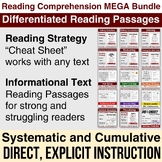
Reading Comprehension Strategies MEGA Bundle + Differentiated Reading Passages!

Cursive Handwriting Practice Worksheets

AP Language Exam Essay Flashcards - Writing Scaffold - Test Prep - 3 essay types

AP Language Exam Prep FLASHCARD BUNDLE - Rhetorical Device + Essay Writing Cues
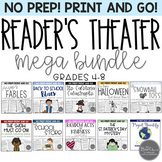
Reader's Theater Bundle: 12 Engaging Scripts for Big Kids

Math Escape Room - Fun Review Activity! Grades 4 to 7, 2 difficulty levels

7th Grade Math Mazes, Riddles, Color by Number BUNDLE Print, Digital
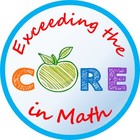
7th Grade Math Escape Rooms Bundle ★ Digital and Printable

Writing Rubric - Expository, Argumentative, Narrative (Common Core)


RACE Strategy Grading Rubric

Literary Analysis Paragraph Writing Checklist Guide & Rubric FREE
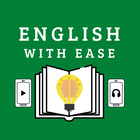
Historic Tribe Project-Indian home model

Ontario Writing Rubric & Achievment Chart Grade 1-8
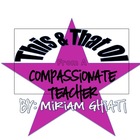
Paragraph Writing Rubric

Informative Writing Rubric - Explanatory Self Editing Template 6th-12th FREEBIE

Compare and Contrast Rubric

Biography rubric for 5th grade

- Word Document File
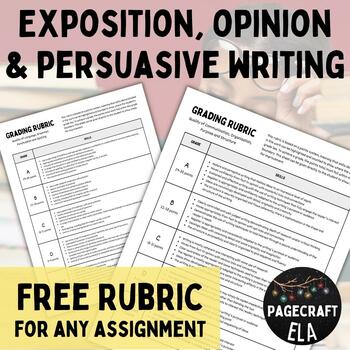
FREE Rubric for Grading Exposition, Opinion and Persuasive Writing Assignments

5 Paragraph Essay Rubric

Summary Rubric
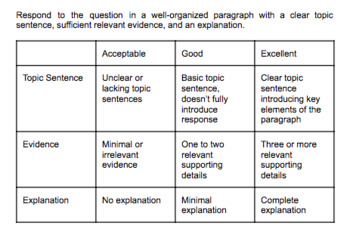
Rubric for One Paragraph Explanatory Writing Assignment

Persuasive Essay Organizer and Rubric

FREE Information Writing Mini Lessons for Middle School

Writing Rubric for Expository

Student Checklists for Informative and Opinion Writing

Step Up To Writing: 8-11 Sentence Graphic Organizer & Rubric

Informative/Expository writing checklist for peer editing

6 Traits Writing Rubric

- Publisher files
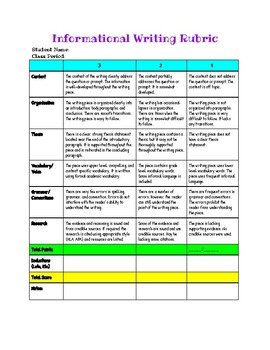
Informational Writing Rubric

RACED Writing Rubric for Constructed, Open, and Extended Responses

Intro,Body, Conclusion Paragraph Rubrics

FREE Expository Essay Rubric for Literary Analysis

- We're hiring
- Help & FAQ
- Privacy policy
- Student privacy
- Terms of service
- Tell us what you think
Expository Essay
Expository Essay Examples
Free Expository Essay Examples For Students
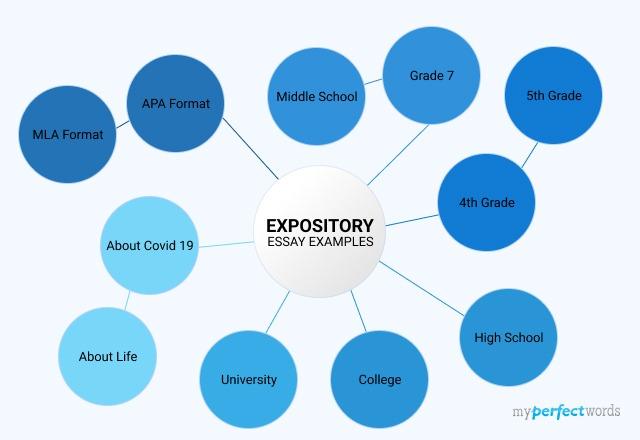
People also read
Complete Guide to Expository Essays: Writing Help and Topics
Interesting Expository Essay Topics For Your Next Paper
How to Write an Expository Essay Outline Like a Pro
Types of Expository Writing - Definition and Examples
Ultimate Guide to Writing an Expository Essay About a Person
Learn to Write an Expository Essay About Yourself
Learn the Basics of Crafting an Expository Essay about a Book
Learn to Write Expository Essay About Mental Health - Examples & Tips
How to Write an Expository Essay about Bullying: A Guide
Expository Essay About Dogs: Steps, Examples & Topics
A Guide to Writing an Expository Essay about Education
Expository Essay About Friendship: A Writing Guide
Discover How to Write Expository Essays About Music – A Step-by-Step Guide
Are you a student struggling to understand the intricacies of expository essay writing?
Do you find yourself in need of clear guidance and practical examples to master this essential skill? Look no further!
In this guide, we'll look into 10+ expository essay examples, providing you with the knowledge you need to start writing. From understanding the fundamentals to dissecting real examples, we've got you covered.
Let's get started on this journey!
- 1. What is Expository Essay Writing?
- 2. Expository Essay Examples
- 3. How to Write an Expository Essay - Example
What is Expository Essay Writing?
An expository essay is a form of academic writing that aims to inform, explain, or describe a particular topic to the reader.
The primary purpose of an expository essay is to provide a clear presentation of facts, ideas, or concepts, often without the writer's personal bias or opinion. The expository essay is a genre of essay that is similar to a descriptive essay .
There are several types of expository writing , including:
- Definition essay
- Classification essay
- Process analysis essay
- Cause and effect essay
- Problem solution essay
- Compare and contrast essay
Newspaper articles, journals, and essays that define and explain a particular topic demonstrate expository essay writing.
Read the examples and learn to write a good expository essay for your school or college assignment.

Paper Due? Why Suffer? That's our Job!
Expository Essay Examples
While writing an expository essay, you might face difficulties in formatting and logically connecting your information. Below we have presented some amazing examples to help you understand how to write and organize an expository essay.
Expository Essay Outline Examples
Whenever you write an expository essay, the first thing you should do is craft an outline. The expository essay outline gives shape to your essay and keeps you organized.
Here are some good expository essay outline examples that you can follow to outline your essay.
Expository Essay Outline Example
Expository Essay Outline Template Sample
Expository Essay Format Example
While writing an essay, you need to follow a proper format to present your information in a logical sequence.
The typical 5 paragraph essay consists of 1 introduction, 3 body, and 1 conclusion paragraph.
Below we have given expository essay format examples in both APA and MLA format to help you understand the formatting. Check out:
Expository Essay Examples APA Format
Expository Essay Examples MLA Format
Short Expository Essay Examples
As we have discussed above, expository essay writing requires you to describe and explain a particular subject in detail. Achieving this level of detail can be quite challenging when working with a limited word count.
To illustrate how to effectively convey information within limited words, we have provided a short expository essay example.
Short Expository Essay Example
Expository Essay Examples for Middle School
Here are some informative expository essay examples for middle school students to help you grasp the basics of expository essay writing.
Expository Essay Example For Middle School
Expository Essay Example Grade 7
Expository Essay Examples 5th Grade
Expository Essay Examples 4th Grade
Expository Essay Examples for High School
Here are some helpful expository essay examples PDFs for high school students. Check out:
Expository Essay Examples For High School
Expository Essay Examples for College
Looking for a college-level expository essay example? Check out the pdf below:
Expository Essay Examples For College
Expository Essay Examples for University
Here are some good sample expository essay pdf examples for university students.
Expository Essay Example About Life
Expository Essay Examples About Covid 19
Informative Expository Essay Example
How to Write an Expository Essay - Example
While writing an expository essay, you need to follow a proper structure. So that you can easily present your information and evidence in a logical sequence.
Here is a step-by-step process of how to write an expository essay:
Step 1. Choose an Appropriate Topic
- Brainstorm different ideas to select a compelling expository essay topic. Check out our expository essay topics blog for inspiring ideas.
- Ensure it has the potential to turn into an informative essay by being able to explain and inform effectively.
Step 2. Craft an Engaging Introduction
- Begin with a captivating hook statement to grab the reader's attention.
- Provide a brief background on the chosen topic to clarify its relevance.
- Formulate an informative thesis statement that encapsulates the core idea of your essay.
Step 3. Develop the Body Paragraphs
- Start each body paragraph with a clear topic sentence , representing the main idea of that particular paragraph.
- Support the topic sentence with credible evidence, facts, or examples that bolster your thesis statement.
- Ensure a smooth transition between paragraphs for a logical flow of ideas.
Step 4. Conclude Effectively
- Start the essay conclusion paragraph by reasserting your thesis statement.
- Summarize the key points and main arguments presented in the essay.
- Encourage the reader with a call to action, prompting them to contemplate or engage further with the topic.
Step 5. Proofread and Edit
- Proofread your essay for grammatical and spelling mistakes and check if the information is presented in a proper sequence.
- Write multiple drafts and edit as needed to ensure your essay is free of errors.
Tough Essay Due? Hire Tough Writers!
In conclusion, these expository essay examples offer a valuable resource for students. They serve as effective learning tools, providing insight into the art of expository writing. By studying these examples, students can improve their writing skills, and gain a deeper understanding of essay structure.
Need assistance with expository essay writing? Finding a website to write my essay ? MyPerfectWords.com is a legitimate essay writing service that provides top-notch essays at reasonable prices. Our expository essay writing service will craft 100% original and non-plagiarized essays within a short deadline.
Stop being worried and place your order now to hire the best essay writers!
Frequently Asked Questions
What are 3 examples of expository.
The three main examples of expository are;
- Scientific reports
- Magazine articles
- Academic essays
What are the 4 characteristics of expository text?
The main characteristics of expository text are;
- Informative
- Clarity
- Unbiased
- Impersonal
- Organization of the text
What is the first important step in writing an expository essay?
To write an expository essay, you must first decide how to structure your work. An expository essay generally contains an introduction, followed by three body paragraphs and a conclusion.

Write Essay Within 60 Seconds!

Caleb S. has been providing writing services for over five years and has a Masters degree from Oxford University. He is an expert in his craft and takes great pride in helping students achieve their academic goals. Caleb is a dedicated professional who always puts his clients first.

Paper Due? Why Suffer? That’s our Job!
Keep reading


IMAGES
VIDEO
COMMENTS
Expository — 7 STAAR Grade 7 March 2015 Score Point 2 The writer describes two personal friendships to explain the controlling idea (the importance of having a friend is you have to give respect, loving, and you have to keep each others secrets). This organizational strategy is responsive to the expository purpose. The
Spark your students' interest with these 100 7th grade expository writing prompts, including compare and contrast prompts, descriptive writing ideas, and more.
EXPOSITORY, OPINION, & ARGUMENTATIVE WRITING Read the paragraphs below and decide if they are examples of expository, argumentative or opinion writing. Circle your response. 1. In 1991, a frozen mummy was unearthed in the high mountain peaks near the borders of Italy and Austria. Known as the Iceman of the Alps, he was preserved in a
Get past the thesis statement with two examples of expository essays. Learn more about the format, requirements, and types of expository writing for middle and high school.
Grade 7 Writing Expository Prompt READ the following quotation. If you run into a wall, don't turn around and give up. Figure out how to climb it, go through it, or work around it. —Michael Jordan THINK about the following statement. No one can achieve success without overcoming obstacles. WRITE an essay explaining the importance of never ...
Grade 7 Level 5 Writing Sample. Global warming has become a serious threat to our planet. Explain what we can do as citizens to reduce the effects of global warming. You may want to consider factors, such as: recycling. the impact of fossil fuels (oil, gas and coal) the impact of consumerism (buying things). View full size.
Expository Writing Prompts for 7th Graders. Switching gears, expository tasks encourage your 7th grade students to investigate an idea, evaluate evidence, and present a clear point of view on the subject. ... You're going to find examples of prompts and responses incredibly useful for understanding the concept better. When it comes to prompt ...
The structure of your expository essay will vary according to the scope of your assignment and the demands of your topic. It's worthwhile to plan out your structure before you start, using an essay outline. A common structure for a short expository essay consists of five paragraphs: An introduction, three body paragraphs, and a conclusion.
The following B.E.S.T. Writing sample test materials are available on the Florida Statewide Assessments Portal as shown below: Elementary Grade Band Grade 4 - Expository Grade 5 - Argumentative Middle Grade Band Grade 6 - Expository Grade 7 - Argumentative Grade 8 - Expository High School Grade Band Grade 9 - Argumentative Grade 10 - Expository
7th Grade Expository Writing. hamburger_paragraph.pdf: File Size: 1165 kb: File Type: pdf: Download File "Consuming Kids" Documentary. Throughout the Unit, we will refer to sections of this documentary. This documentary may be utilized in both Argumentative Writing and Expository Writing.
Grade 7 Level 4 Writing Sample. Global warming has become a serious threat to our planet. Explain what we can do as citizens to reduce the effects of global warming. You may want to consider factors, such as: recycling. the impact of fossil fuels (oil, gas and coal) the impact of consumerism (buying things). View full size.
Sample 7 (S‑7) Student Response Score Point 2/2/2. ... Grade 7 2022 B.E.S.T. Writing. Writing Prompt. Write an expository essay about the benefits of different kinds of housing. ... Grade 7 2022 B.E.S.T. Writing. 6 When most people think of housing, images of houses and apartments come to mind. However, many types of housing have benefits.
demonstrates a lack of understanding of the expository writing task. Use of Language/Conventions The writer's word choice may be vague or limited. It reflects little or no awareness of the expository purpose and does not establish a tone appropriate to the task. The word choice may impede the quality and clarity of the essay.
Writing Rubric - Expository, Argumentative, Narrative (Common Core) Created by. Ashlei Mosher. Use this rubric to assess any type of writing! It has categories that focus on ideas, organization, voice, and word choice for example. A student can score in the Not Yet, Developing, or Strong category.
Provide a brief background on the chosen topic to clarify its relevance. Formulate an informative thesis statement that encapsulates the core idea of your essay. Step 3. Develop the Body Paragraphs. Start each body paragraph with a clear topic sentence, representing the main idea of that particular paragraph.
Seventh Grade Narrative Writing Sample 4. Seventh Grade Summary Sample 1. Seventh Grade Summary Sample 2. Seventh Grade Summary Sample 3. Seventh Grade Summary Sample 4. Seventh Grade Argumentative Essay Sample 3. Seventh Grade Argumentative Essay Sample 4.
The Benchmarks for Excellent Student Thinking (B.E.S.T.) Writing Scoring Samplers can be used as a resource regarding the scoring of student responses on the Writing assessment. In each sampler, examples of student responses represent various combinations of the score points across the scoring domains. As a basis for developing a common ...
Grades 7-10 Expository Rubric Responses are scored holistically by domain and earn scores by demonstrating most of the descriptors defined in a given score point.*. Central idea is focused on the task and • Skillful development demonstrates thorough • Integration of academic vocabulary consistently maintained throughout. understanding of ...
Grade 7 2018 ELA Writing. Grades 6-10 Argumentative Text-based Writing Rubric (Score points within each domain include most of the characteristics below.) Score. Purpose, Focus, and Organization (4-point Rubric) Evidence and Elaboration (4-point Rubric) Conventions of Standard English (2-point Rubric) 2.
Writing, p. 25 • Lesson 3: Expository and Narrative Book Covers and Summa-ries, p. 33 • Lesson 4: Strategic Reading - Informed Writing, p. 39 • Lesson 5: Strategic Reading - Orga-nization and Text Conventions, p. 47 • Lesson 6: Close Read-ing Challenge, p. 53 • Lesson 7: Analyzing and Annotating Ex-pository and Opinion Writing, p. 57